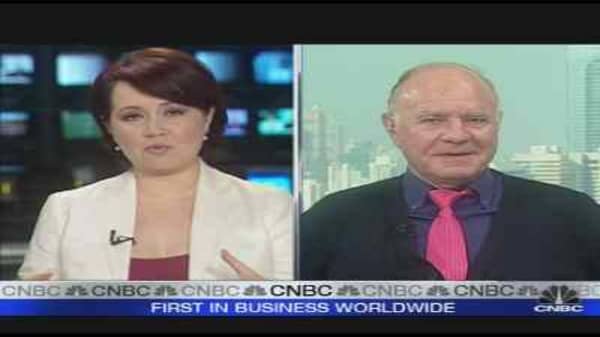Stocks snapped their best five-day winning streak in 75 years with a resounding crack, giving back more than half the gains in one session.
The Dow Jones Industrial Average shed nearly 700 points, or nearly 8 percent, after gaining more than 1,200 points in the prior five sessions. The S&P 500 index lost 8 percent.
It was the worst one-day drop for the Dow and S&P since mid-October.
"I think that this market has dispelled any expectations of normal," said Alan Gayle, senior investment strategist at RidgeWorth Investments. "[A]fter a very strong five-day performance it’s not surprising to see some softness in the market but the aggressiveness of the selloff took a lot of people by surprise."
The tech-heavy Nasdaq fell a whopping 9 percent amid worries about the impact of the slowdown on tech spending.
Speaking of the slowdown, it's official: We're in recession. And have been for a year. The National Bureau of Economic Research officially declared today that the U.S. economy slipped into recession in December 2007.
Today's economic data backed up the call: The Institute for Supply Management reported its manufacturing index fell to 36.2 in November, the weakest reading since 1982. Readings below 50 indicate contraction. This came on the heels of reports of weaker manufacturing activity in China and Europe.
A separate report showed U.S. construction spending fell 1.2 percent in October after holding steady in September.
Stocks had been steadily declining all day but fell sharply just before 3 p.m., when Treasury Secretary Hank Paulson started speaking. Paulson said the government is working on more programs to stimulate lending.
Gayle said a lot of today's selling was defensive, with financials and consumer-discretionary taking the hardest hits.
Citigroup, Bank of America and JPMorgan held a lock on the bottom three spots on the Dow.
Citigroup tumbled 22 percent to $6.45 after an analyst projected more losses for the bank.
Bank of America lost 21 percent and JPMorgan fell 18 percent.
And, while early projections indicate Black Friday sales rose 3 percent from last year, retail stocks fell more than 4 percentamid worries that increased traffic won't translate into profits and this will be one of the worst holiday seasons for retailers in decades.
Department-store operators took it on the chin, with Macy's and JC Penney shedding at least 13 percent.
Even the discount chains were hard hit, with Wal-Mart down 5.1 percent, Big Lots off 11 percent and Target down 13 percent.
Shoppers were expected to hit online stores in droves today, "Cyber Monday," as the Monday after Thanksgiving has come to be known, but investors weren't buying it, sending shares of online retailers Amazon and eBay down more than 5 percent. Amazon is expected to be one of the season's brightest online starsbut analysts predict that overall e-commerce sales will be flatfor the season.
>> Check in on how the holiday season is shaping up at CNBC's Holiday Central.
Worse news may be on the way for consumers and credit: The credit-card industry may pull back more than $2 trillion of lines of credit over the next year-and-a-half due to risk aversion and regulatory changes, Oppenheimer & Co. banking analyst Meredith Whitney said in a research note.
Swings like we've seen in the past few months tend to provoke more than a little trash talking. And today, the gauntlet was thrown at the feet of the Oracle of Omaha himself.
Warren Buffet's investment strategy of buying and holding no longer applies in this volatile market, Marc Faber, editor & publisher of The Gloom, Boom & Doom Report, told CNBC this morning.




